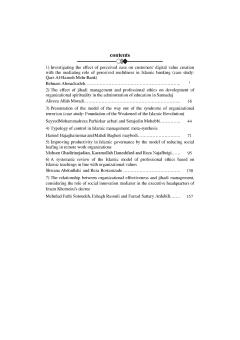Presentation of the model of the way out of the syndrome of organizational terrorism (case study: Foundation of the Weakened of the Islamic Revolution)
Subject Areas : Islamic governanceSeyyed Mohammad Reza Parhizkar Azbari 1 , Serajedin Mohebbi 2 *
1 - PhD Student, Department of Public Management, Kish Branch, Islamic Azad University, Kish, Iran
2 - Associate Professor, Department of Management, Shiraz Branch, Islamic Azad University, Shiraz, Iran
Keywords: Organization, Organizational Terrorism, Foundation of the Underprivileged of the Islamic Revolution,
Abstract :
The aim of this research was to deal with the organizational terrorism of the Islamic Revolution Foundation. The statistical population consists of managers and senior officials of the Mustafa Foundation, university professors and experts in the field of human resources, using targeted and snowball sampling methods. By conducting 20 interviews, the collected information reached the saturation point. From the method of coding and drawing the network of concepts, compiling the research model and determining the components and indicators of the organizational terrorism model, the validity of each of them was confirmed. The thematic network method was used to analyze the data in the qualitative part. In the quantitative part of the statistical test, confirmatory factor analysis was used to formulate the final model, dimensions, components and indicators and prioritization. The results of the research showed that the sample group considered factors such as flexible nature, comprehensive needs assessment, flexibility in the method, efficient human resources, attention to return costs and suitable learning environment among the effective factors in the quantitative and qualitative part.
حبیبیدوست، م؛ فدوی، م؛ فرهادی، ه. (1400)، راهکارهای مقابله با سندرومهای سازمانی در مدارس ایران از دیدگاه متخصصان آموزش و پرورش، مجله سبک زندگی اسلامی، دوره 6، شماره 3.
صادقیان، ر؛ رشیدپور، ع. (1398)، عوامل موثر بر تعالی سازمانی در بنیاد مستضعفان انقلاب اسلامی، فصلنامه تحقیقات حسابداری و حسابرسی، شماره 41، صص 89-110.
یداللهی، م؛ یداللهی، م. (1400)، آثار فردی و سازمانی سندرومهای سازمانی، فصلنامه تخصصی تحول اداری وابسته به سازمان اداری و استخدامی کشور، شماره 10، دوره 64.
Arar, T., Öneren, M., & Yurdakul, G. (2022). Proposing a New Term for Organizational Behavior Literature: Achilles’s Tendon Syndrome in Businesses. Journal of Information and Organizational Sciences, 46(1), 79-101.
Caldwell, C., & Canuto-Carranco, M. (2010). “Organizational terrorism” and moral choices–Exercising voice when the leader is the problem. Journal of Business Ethics, 97, 159-171.
Crenshaw, M. (1987). Theories of terrorism: Instrumental and organizational approaches. The Journal of strategic studies, 10(4), 13-31.
Gordon, A. (2005). Terrorism as an Academic Subject after 9/11: Searching the Internet Reveals a S tockholm Syndrome Trend. Studies in Conflict & Terrorism, 28(1), 45-59.
HabibiDost, M., Fadavi, M., & Farhadi, H. (2021). Ranking and Comparison of Organizational Syndromes in Iranian Schools According to the Opinion of Principals, Deputies and Teachers. Curriculum Research, 2(1), 58-62.
Kruglanski, A. W., & Fishman, S. (2006). The psychology of terrorism: “Syndrome” versus “tool” perspectives. Terrorism and Political Violence, 18(2), 193-215.
Lester, J., S. Christos, M. F. Kordick, and S. B. Chan. "164: Terrorism: Would Emergency Physicians Be Able to Recognize Terrorism Syndromes." Annals of Emergency Medicine 48, no. 4 (2006): 51.
Petryszyn, K. R., Young, J. P., Neil, E. R., Benedict, J. E., & Eberman, L. E. (2023). Second Victim Syndrome and Organizational Support for Healthcare Providers: A Scoping Review. Internet Journal of Allied Health Sciences and Practice, 21(3), 21.
Purwandari, R., Afandi, A. T., & Imani, D. A. R. (2022). The Relationship between Burnout Syndrome and Nurse Organizational Commitment at Hospital. NurseLine Journal, 7(2), 118-125.
Santi, M. W., Nandini, N., & Alfiansyah, G. (2020). The effect of burnout syndrome on turnover intention using organizational commitment as an intermediate variable. Jurnal Administrasi Kesehatan Indonesia, 8(2), 109-122.
Tayebi, M. (2022). Identification of organizational syndromes in sports boards. Sport Management Journal, 14(4), 321-305.
Walker, D., & Myrick, F. (2006). Grounded theory: An exploration of process and procedure. Qualitative health research, 16(4), 547-559.

